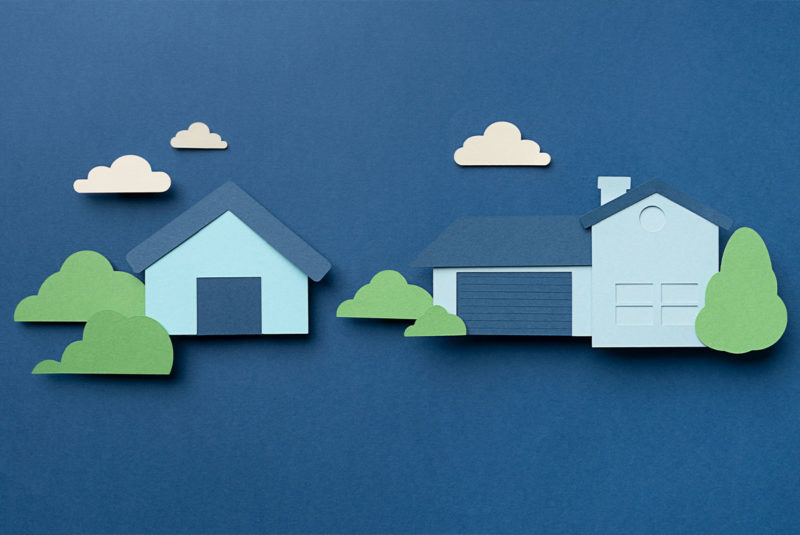Ready To Buy a Home?
Get Approved to Buy a Home
Rocket Mortgage® lets you get to house hunting sooner.
Owning a rental property is a popular strategy for creating a secondary income. When managed correctly, a good rental property can help you generate regular monthly cash flow and build equity over time. Additionally, several tax benefits come with property ownership, such as the possibility of writing off depreciation.
Managing any sort of rental or investment property will naturally create some costs. In addition to the initial down payment and cost of buying the property, rental property owners will also typically need to invest in various upgrades.
While many of the costs of owning a rental property tend to be concentrated at specific points in time, the benefits of ownership tend to be more spread out.
Ultimately, rental property depreciation is a strategy that can be used to help spread the costs of property ownership over time. If you currently own one or more rental properties, then taking advantage of the rental depreciation deduction can help you significantly reduce your next tax bill.
What Is Rental Property Depreciation?
Depreciation is a term used to describe how physical assets – such as a rental property – wear over time. Without active upkeep and investment, rental properties can quickly become dilapidated. This not only creates problems for the property owners and current renters but also decreases the value of other properties in the neighborhood.
In the eyes of the IRS, owning a rental property is a long-term expense. Currently, the IRS estimates the “useful life” of most rental properties is 27.5 years.[1]
Even if an investor made a 100% initial down payment, the depreciation costs of owning the property will be distributed over time. So rather than writing off the entirety of the property’s depreciation expenses in the first year, property owners can distribute these write-offs over the next 27.5 years.
It is important to remember that the use of depreciation does not mean a property’s value has decreased. In many cases, thanks to increasing home prices, the property might be worth more now than it was at the time of purchase.
Depreciation is simply a way to spread expenses over time for tax and other financial benefits. This cost allocation strategy is not unique to the rental property industry. In fact, depreciation strategies can be found in almost every industry with physical assets.
Depreciation tax benefits
Rental property owners need to understand depreciation because it will likely be one of the easiest ways for property owners to decrease their taxable income. When eligible, property owners could use the depreciation deduction to decrease their taxable income by thousands of dollars per year.
To claim the depreciation tax deduction, property owners must file IRS Form 4562, which is used to address most depreciation and amortization needs.
As suggested, the standard useful lifespan for rental properties is 27.5 years. This means that, when distributed evenly over the property’s life, rental owners can deduct 3.636% (which equals 100% divided by the 27.5-year useful lifespan) of the property’s initial cost basis each year.
Rules for rental property depreciation
Though the depreciation deduction can be accessed by many rental property owners, there are still quite a few rules they will need to keep in mind. Perhaps most importantly, they must actually own the property (not manage it for someone else) and the property must also produce a regular and verifiable taxable income.
Additionally, the property must be developed (not just land) and include a rentable structure. This structure must also have a verifiable “useful life” that can be expected to depreciate over time. This useful life must be greater than one year and deductions cannot be claimed for properties that were acquired and put into service during the same year.
In the event of an audit, property owners who claimed the depreciation might be asked to prove ownership and the sound use of deductions. If they are unable to, they may face financial or legal consequences.
How Is Depreciation Calculated?
There are several different ways to calculate depreciation. But for rental properties claiming the depreciation deduction, most property owners will use the straight-line depreciation method. This method assumes that the property will depreciate linearly and, therefore, depreciation costs can be evenly distributed over time.
To calculate depreciation, property owners will need to establish a sound cost basis, as well as determine the useful life of the property at hand.
Step 1: Determine the cost basis
The depreciation deduction can only be used for the physical rental unit. To determine the cost basis, property owners must begin by separating the value of the unit from the value of the land. This means they might need to hire an assessor or similar professional.
The cost basis includes the value of the physical rental unit, as well as other fees and costs accrued while purchasing it. This might include legal fees, transfer fees, survey fees, utility charges, title insurance and more.
The cost basis offers a starting point but this can change over time. For example, serious home improvement investments can be added to the initial cost basis. Investments such as new roofing, siding, utilities and other major home improvements can all potentially cause the initial cost basis to change.
Step 2: Determine the useful life of a property
The next step in calculating depreciation is to determine the useful life of the property. The “standard” useful life, at least from a tax perspective, is 27.5 years. But other depreciation distribution methods might also be considered.
Following the introduction of the Modified Accelerated Cost Recovery System (MACRS) in the 1980s, property owners can choose either the General Depreciation System (GDS) or the Alternative Depreciation System (ADS) to determine the useful life of a property.[1]
Most properties will use the GDS which allows for the useful life of 27.5 years for a rental property, except for farms and other tax-exempt properties that use the ADS.
Step 3: Divide the cost basis by the property’s useful life
Once a property owner has identified the cost basis and the property’s useful life, they will then be able to calculate their annual depreciation deduction. When using the straight-line depreciation method, all the property owner will need to do is divide the cost basis by the useful life.
Suppose a property has a cost basis of $300,000 and the useful life of the property is 27.5 years. In this instance, the annual depreciation deduction would be about $10,909.09 per year. If the property owner is paying a marginal tax rate – the amount of tax you’d pay on any additional dollar of income – of 30%, this means taking advantage of the depreciation deduction will save them more than $3,000 per year.
How Long Does Depreciation Last?
For rental property owners, depreciation will last until the entire cost basis has been deducted. In cases where the property owner is using the straight-line depreciation method, and the property is continually occupied, this cost basis will be exhausted in 27.5 years.
However, there are some exceptions to this standard timeline. For example, if the property is idle and not in use, the property owner will not be able to claim the depreciation deduction. And if the property is “retired,” or never used again as a rental property, the owner will miss out on possible depreciation deductions. But once the property starts to be rented again, depreciation deductions can resume, though this will extend the total timeline.
Frequently Asked Questions
Of course, the depreciation tax deduction can often be confusing. Here are some of the most common inquiries property owners have.
What happens to depreciation when a rental property is sold?
When you sell a rental property that has not been fully depreciated, you will often be subject to a depreciation recapture tax. Your depreciation deductions will then be treated as ordinary income, which will be subject to a tax of either 25% or your current tax bracket (whichever is lower).[1]
What happens if I don’t claim depreciation on a rental property?
You are not required by law to claim depreciation on a rental property – but there isn’t any good financial justification for choosing not to. As long as you qualify, you should claim it. By choosing not to claim the depreciation deduction on a rental property, you will typically end up paying more in taxes than you need to each year.
What’s the rental property depreciation income limit?
The depreciation deduction can generally only be claimed by property owners who have a modified adjusted gross income of $100,000 per year or less.[1] Your modified adjusted gross income represents the amount of taxable income you’ll have each year. This will often be much lower than the amount of money you actually earned.
People with an income at or below this level can claim depreciation up to $25,000. After that, the amount they will be able to claim will gradually taper off, until their modified AGI exceeds $150,000.[1]
What is depreciation recapture?
Depreciation recapture occurs when a property owner realizes a capital gain after selling a depreciated property. When this occurs, the capital gain will be treated as ordinary income and taxed at a rate up to 25%.
You’ll Appreciate Depreciation During Tax Season
Ultimately, the depreciation tax deduction is one of the biggest benefits of being a property owner. If you are currently the owner of a rental property, it might be a good idea to meet with a financial advisor to come up with a depreciation strategy that can effectively meet your needs.
Take the first step toward buying a home.
Get approved. See what you qualify for. Start house hunting.
The Short Version
- Taking advantage of the rental depreciation deduction can help you significantly reduce your next tax bill if you currently own one or more rental properties
- Depreciation is simply a way to spread expenses over time for tax and other financial benefits
- The standard useful lifespan for rental properties is 27.5 years[1]
Internal Revenue Service. “Publication 946 (2021), How To Depreciate Property.” Retrieved June 2022 from https://www.irs.gov/publications/p946




